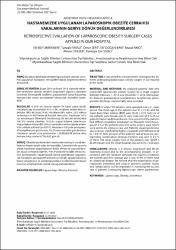HASTANEMİZDE UYGULANAN LAPAROSKOPİK OBEZİTE CERRAHİSİ VAKALARININ GERİYE DÖNÜK DEĞERLENDİRİLMESİ

View/
Access
info:eu-repo/semantics/openAccessDate
2021Author
Büyükerkmen, ElifYavuz, Tunzala
Sert, Ömer
Doğan Bakı, Elif
Akıcı, Murat
Yüksek, Ahmet
Sıvacı, Remziye Gül
Metadata
Show full item recordCitation
BÜYÜKERKMEN, E., YAVUZ, T., Ömer, S. E. R. T., BAKI, E. D., AKICI, M., YUKSEK, A., & SIVACI, R. (2021). HASTANEMİZDE UYGULANAN LAPAROSKOPİK OBEZİTE CERRAHİSİ VAKALARININ GERİYE DÖNÜK DEĞERLENDİRİLMESİ. Kocatepe Tıp Dergisi, 22(4), 282-286.Abstract
AMAÇ: Bu çalışmada hastanemizde laparoskopik obezite cerrahisi uygulanan hastaların retrospektif olarak değerlendirilmesi
amaçlandı.
GEREÇ VE YÖNTEM: Şubat 2014 ve Aralık 2018 arasında tek hekim tarafından obezite cerrahisi uygulanan olguların dosyaları
incelendi. Demografik özellikler, postoperatif komplikasyonlar,
hastane kalış süresi, postoperatif taburculuk, mortalite kaydedildi.
BULGULAR: 4 yıllık bir süreçte toplam 89 hasta opere edildi.
Hastaların yaş ortalamaları 41±11,44, ortalama beden kitle indeksleri (BKİ) 46,26±6,74 idi. Hastaların 66’sı kadın, 23’ü erkekti
ve bunların % 44,9’unda ek hastalık mevcuttu. Hastaların %9’u
zor entubasyon (fiberoptik bronkoskop ile entübe edilen)olup
%67,4’ü servise çıkarken, %32,6sı yoğun bakıma çıkarılmıştır.
Yoğun bakım ihtiyacı BKI 50’nin üzerinde olan hastalarda anlamlı bir şekilde yüksekti (p=0,011). Hastaların %9’unde postoperatif komplikasyon görülürken, %2,2’sinde mortalite görülmüştür.
Hastaların cerrahi süre ortalamaları 120,09±68,09 dakika olup
hastane kalış süreleri 6,76±4,62 gün idi.
SONUÇ: Obezite beraberindeki hastalıklar nedeniyle kronik ilerleyici ve hayatı tehdit eden bir hastalıktır. Literatürle de uyumlu
olarak hastaların çoğunluğunun kadın olması ve yaş ortalamaları düşük olmasına rağmen, %44,9’unda ek hastalık olması bunun göstergesidir. Laparoskopik sleeve gastrektomi uygulanacak hastaların perioperatif anestezi ve cerrahi uygulamalarının,
hasta sonuçlarının ve komplikasyonların incelenmesinin başarı
oranının artırılmasında önemli olacağı kanaatindeyiz. OBJECTIVE: It was aimed to retrospectively investigate the patients undergoing laparoscopic obesity surgery in our hospital
in the study.
MATERIAL AND METHODS: We analyzed patients' data who
underwent laparoscopic obesity surgery by a single surgeon
between February 1, 2014, and December 1, 2018. Demographic features, postoperative complications, hospital stay, postoperative discharge, and mortality were recorded.
RESULTS: A total of 89 patients, were operated over a 4 - years
period. The mean age of the patients was 41 ± 11.44, and the
mean Body Mass Indexes (BMI) were 46.26 ± 6.74. Sixty-six of
the patients were female and 23 were male and 44.9 % of our
patients had an additional disease. Nine percent of the patients
had difficult intubation (intubated via fiberoptic bronchoscope), 67.4 % of the patients were sent to the surgery ward, 32.6 %
were sent to the intensive care unit. Patients requiring intensive
care unit was significantly higher in patients with BMI above 50
(p = 0.011). Nine percent of the patients had at least one postoperative complication whereas mortality was seen in 2.2 %
of them. The mean surgery time of the patients was 120.09 ±
68.09 minutes and the mean hospital stay was 6.76 ± 4.62 days.
CONCLUSIONS: Obesity is a chronic progressive and life-threatening disease due to the accompanying diseases. In accordance with the literature, although the majority of patients
are women and their average age is low, 44.9% of them have
an additional disease. We believe that the examination of perioperative anesthesia and surgical practices, patient results,
and complications will be important in increasing the success
rate of patients undergoing laparoscopic sleeve gastrectomy.















